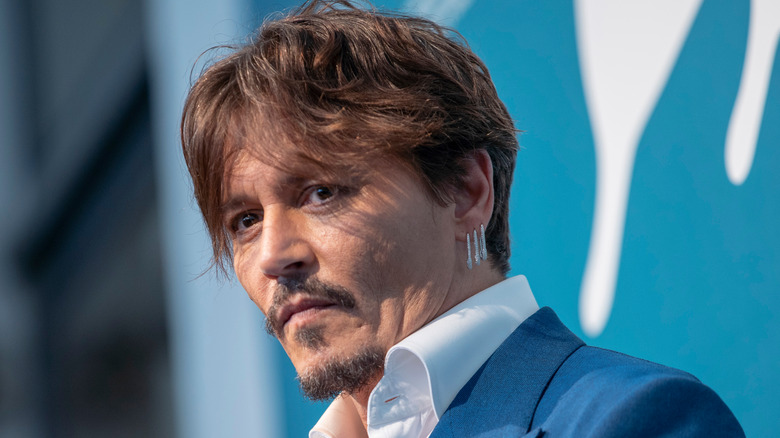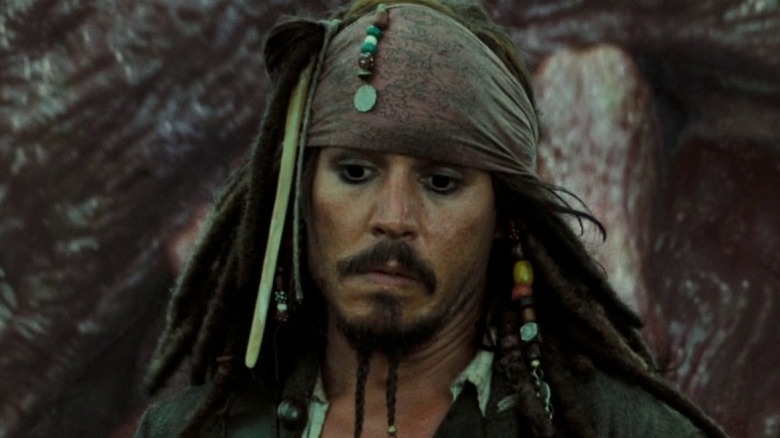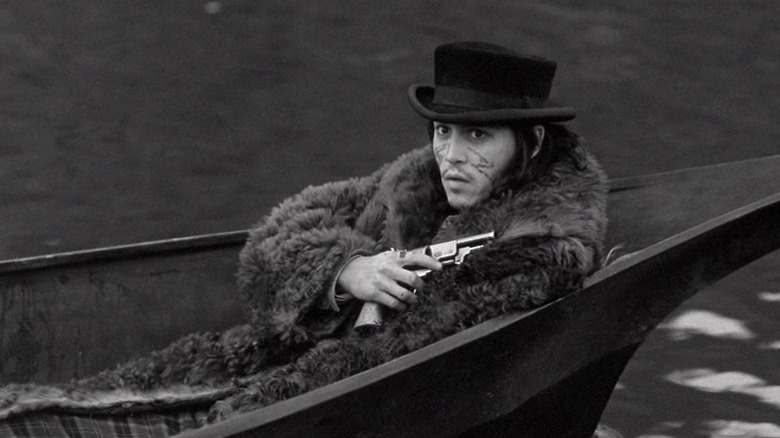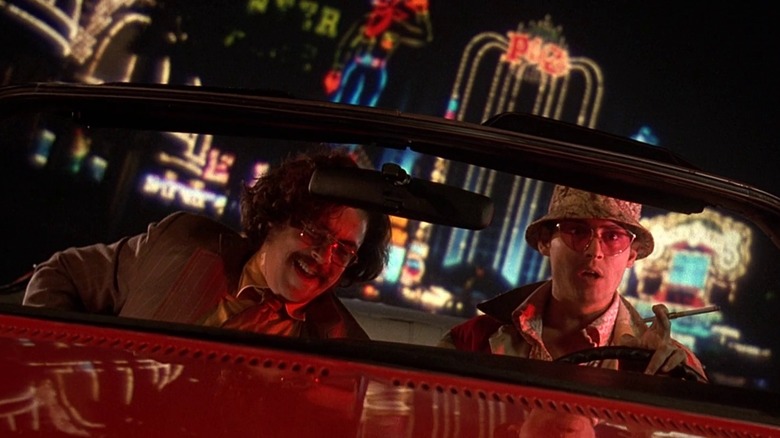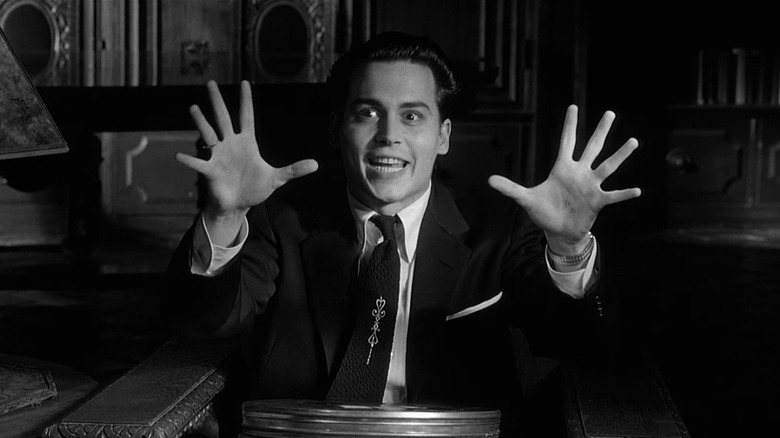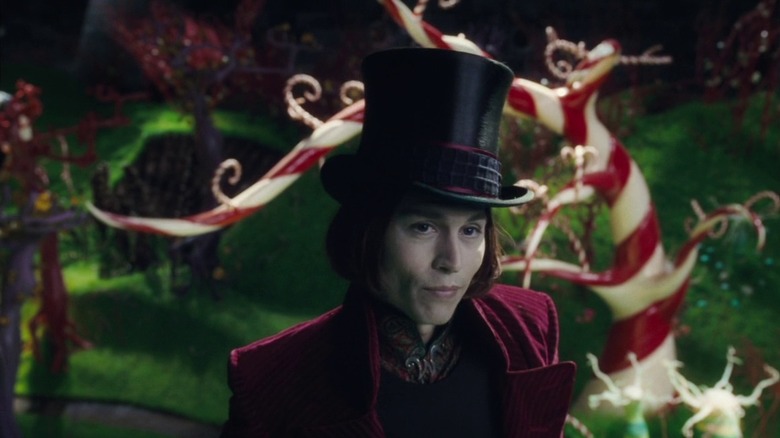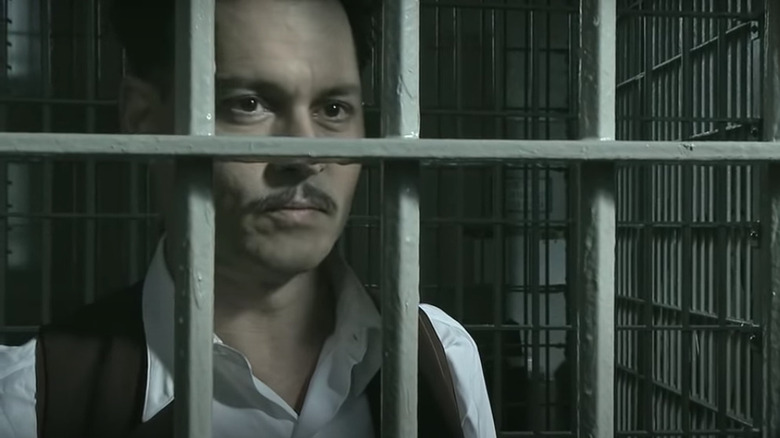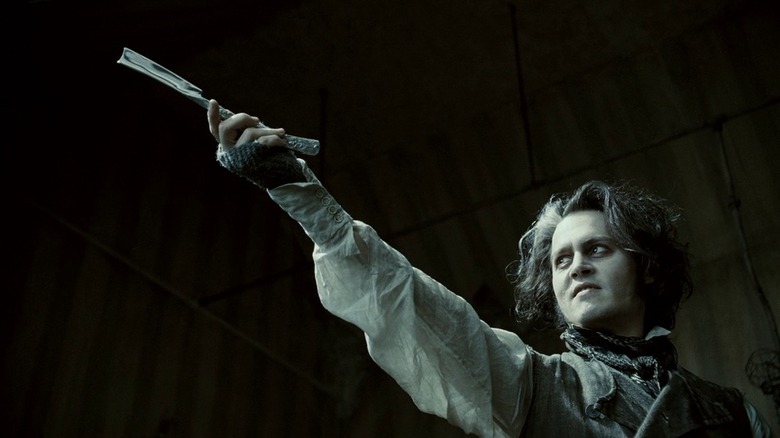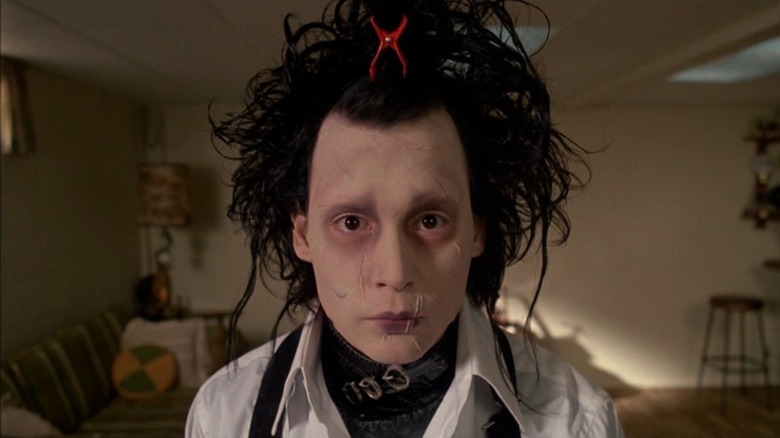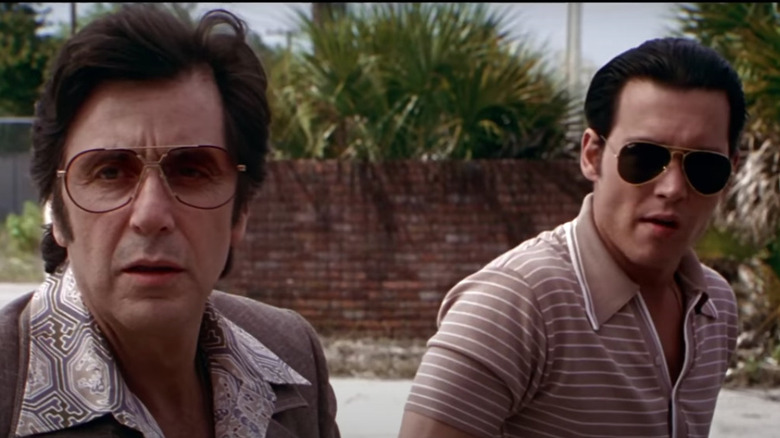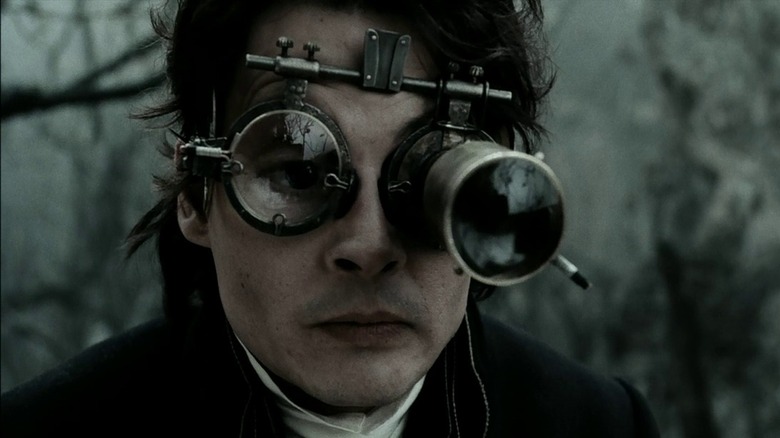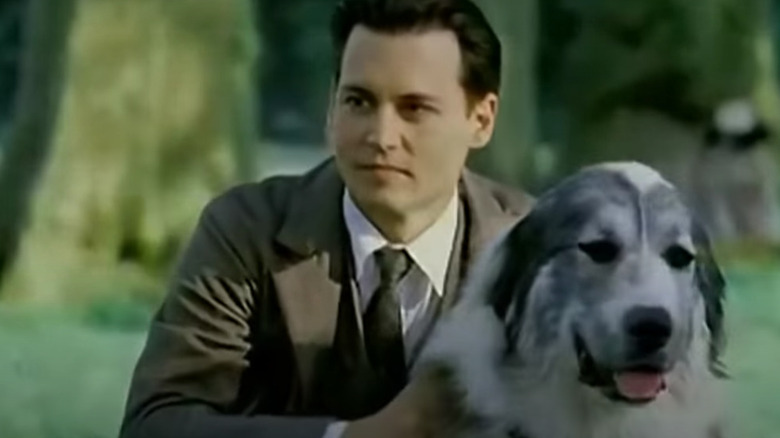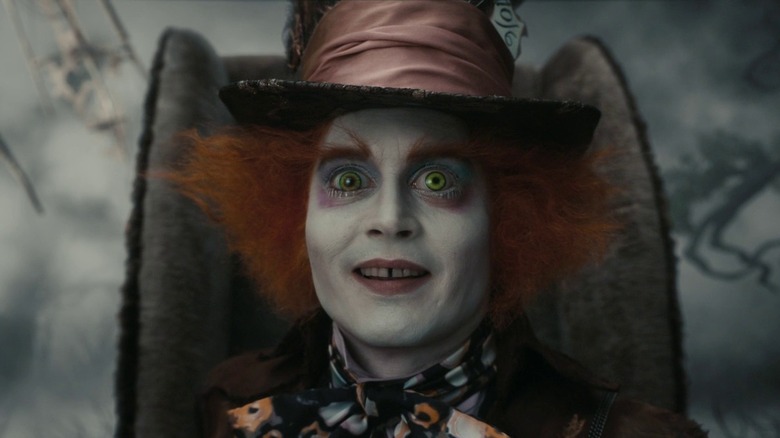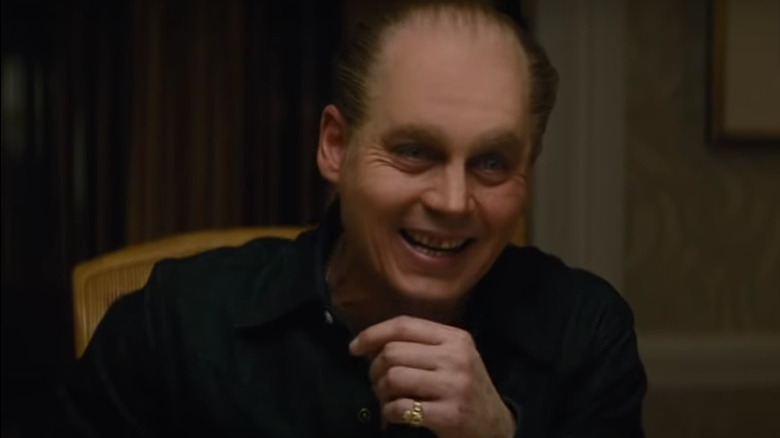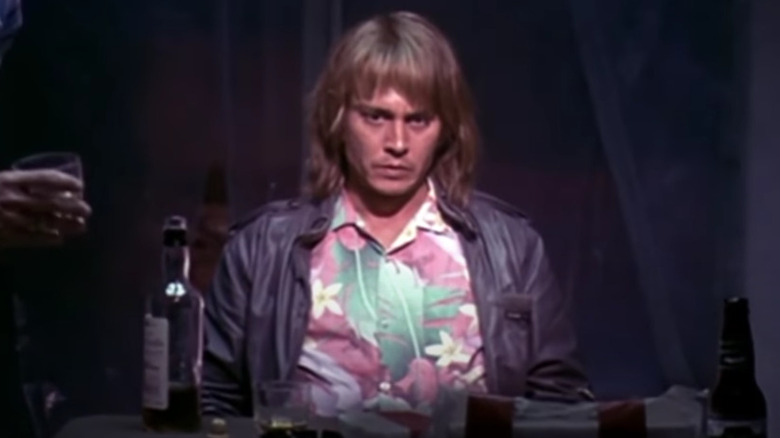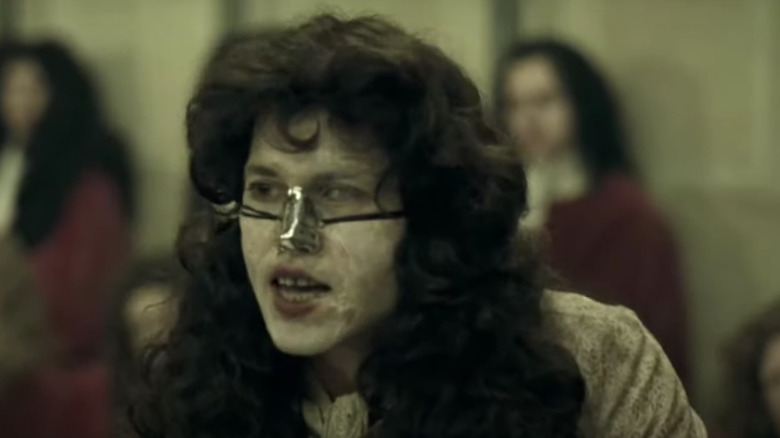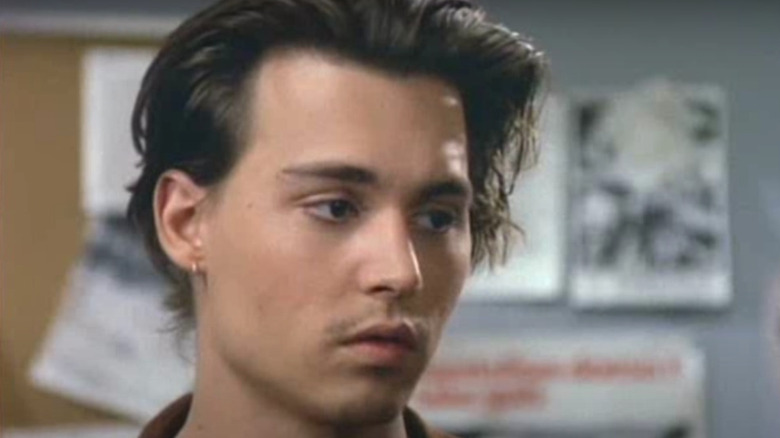Johnny Depp's Best Movie And TV Roles To Date
The fundamental role of any actor or actress is no different from a magician. Both are in the business of creating illusions. They weave their veils, cast their spells, and take the audience on a magical mystery tour into faraway realms. Like a Hollywood version of Gandalf, Johnny Depp has been taking moviegoers by the hand and leading them into strange and unexpected places for over three decades. If movies are magic, the boy from Kentucky is one of the top wand wavers. Good actors will sweat blood and tears to make you believe they're something they're not, but a great actor will convince you they always were the character they're playing – you just didn't know it! As Depp once said, "With any part you play, there is a certain amount of yourself in it. There has to be, otherwise, it's just not acting, it's lying."
Depp is a master at bringing the most bizarre characters to life and delivering performances that linger in the mind's eye long after the final reel has spun. Depp's played a pauper, a pirate, a poet, a perp, and a pawn. He's the king of cult for good reason: his solid-gold acting ability. When a movie ends and the lights go on, the spell cast by a movie breaks. However, certain characters have a habit of hitching a ride home with us and setting up home in our heads. Depp has created a whole bus full of such personalities. Here are a few of them.
Jack Sparrow (Pirates of the Caribbean franchise)
Make no bones about it—unless you're the one walking the plank, pirates have always had an air of romance about them. The myth of freedom-loving princes of the seven seas living life on their terms and outside of the law endures in the form of Captain Jack Sparrow. Depp's most famous and well-paid role catapulted the actor into the consciousness of kids everywhere and led to a surge in appalling pirate fancy dress costumes. It's often easy to overlook, after five films into the "Pirates of the Caribbean" franchise, how iconic and unusual Depp's take on the character was. Gone was the cruelty and cast-iron masculinity that was often the trademark of pirates from a bygone age. In its place were the slightly drunken swagger, poetic whimsy, and oddball mischief of a new type of swashbuckler.
Using Keith Richards from The Rolling Stones as a template for what a hard-drinking, wisecracking, womanizing, and philosophizing outlaw should be, Depp pulled out all the stops to create a flamboyant and over-the-top character whose humor and unhinged personality struck a chord with audiences the world over. Although his appearance in another "Pirates of the Caribbean" movie looks unlikely, Depp, who has often visited children in hospitals dressed as the world's most famous pirate, explained at the 2021 San Sebastian Film Festival, "The beauty of Captain Jack Sparrow for me is that I can travel with Captain Jack in a box."
William Blake (Dead Man)
Shot completely in black and white, Jim Jarmush's 1995 movie "Dead Man" allowed Johnny Depp to star in what has since been dubbed a "psychedelic Western." Playing a character who shares his name with the visionary English poet William Blake, Depp plays a mild-mannered accountant with horn-rimmed glasses and a checked suit who hops a train in search of work as a bookkeeper in the gun-tooting and lawless Wild West. After landing in a quaint little town called Machine, Blake finds the townsfolk are intensely hostile and the job previously promised to him has gone. Things take a turn for the worse when Blake is later caught up in a deadly love triangle and kills a man in self-defense. From then on, Blake is on the run and his odyssey as a dead man walking truly begins.
Fleeing bounty hunters, Blake meets traveling companion Nobody, who believes Blake is the reincarnation of the famous poet. Together the two road buddies travel into the dark soul of America in a strange and dream-like trip."Dead Man" is a Kafka-esque film and Depp gives a commanding performance as a passive soul who is transformed not through ambition or initiative but by a set of bizarre and chaotic circumstances. By the end of the movie, Blake is unrecognizable from the bookish and timid soul he once was. In his place, we have a painted-faced, fur-coat-clad, Stetson-wearing, cold-blooded killer who looks into the abyss and finds it starring right back at him.
Hunter S. Thompson (Fear and Loathing in Las Vegas)
Since their first meeting in December 1994, Johnny Deep and Hunter S. Thompson became the firmest of buddies who liked nothing more than sharing a bottle of whiskey and blowing things up together. Both Depp and Thompson hailed from Kentucky and shared a penchant for all that was weirdly wonderful in life. Sadly, their 10-year bromance came to an end when Thompson passed in 2005. To celebrate their friendship and honor his last wishes, Depp paid $3 million to blast his old buddy's remains out of a 153-foot tall cannon. Yet perhaps the actor's most lasting tribute to the writer is when he played him in all his raging and cosmically befuddled glory in Terry Gilliam's 1998 ode to getting wasted, "Fear and Loathing in Las Vegas."
In "Fear and Loathing in Las Vegas," Depp plays Dr. Gonzo, who exemplifies perfectly what hard drugs and Vegas can do to a man. He's a bald genius who took a few too many wrong turns in life and has seemingly lost the map and his dress sense. It's a rocket ride of a performance. Depp revealed to Rolling Stone he spent a lot of time studying his old friend's mannerisms and expressions and thought processes to get it right. He explained, "It's weird with Hunter — it's more sort of watching the way he thinks. You can see the wheels turning, and you can see an idea coming. That was the key for me."
Ed Wood (Ed Wood)
Since moving images first started to flicker and fade on the big screen, Hollywood has been responsible for all sot of weird and wonderful characters. Yet they don't come much stranger than "Ed Wood." In addition to writing over 80 pulp fiction thrillers, Wood was also a director of low-budget flicks that would one day, thanks to his posthumous Golden Turkey Award for Worst Director of All Time in 1980, become cult classics. Iconic movies such as "Plan 9 from Outer Space," "Orgy of the Dead," and "Necromania" have delighted audiences who love cringeworthy special effects, eccentric actors, outlandish scripts, and technical errors. In a CGI age that is preened, polished, and perfected, Wood's films stand out. It's probably what attracted Depp to playing the tragic Director in Tim Burton's 1994 classic ode to the courage of following your vision, no matter how weird.
Deep is never better than when portraying maverick misfits and Wood is definitely in the elite echelons of those destined to always be on the outside looking in. The genius of Burton's film and Depp's performance is that it introduces Wood to an audience that would have probably given him and his movies a wild berth. It humanizes one of Hollywood's most notorious outcasts and makes a hero of an individual whose ambition outreaches his talent. When the final credits roll, one cannot help but muse poignantly muse on W.B. Yeats' famous line, "The best lack all conviction, while the worst are full of passionate intensity."
Willy Wonka (Charlie and the Chocolate Factory)
Author Roald Dahl's books are so popular with children because he doesn't sugarcoat or simplify his characters. They are flawed, complex, and bubbling with the sort of quirks and eccentricities that fire up the imagination like rocket fuel. As one of the biggest characters Dahl ever brought to life through his prolific pen, Willy Wonka was a perfect match for Depp's acting style and Tim Burton's directorial skills. In contrast to the sweet-natured and wholesome charm of Gene Wilder's take on Willy Wonka in Mel Stuart's 1971 adaption of "Charlie and the Chocolate Factory," Depp goes full-blast wacky and dials up the weirdness to 11. Depp retains Wilder's air of vague melancholy but adds to it a slightly sinister and otherworldly air.
Whereas Wilder has a sparkling twinkle in his eye and exudes that sort of charisma you'd expect from one of Hollywood's elder statesmen, Depp's Wonka remains more loyal to Dahl's vision. His obvious unease in social settings, bouts of childish hysteria, unnervingly high-pitched voice, and neurotic mannerisms all hint at a troubled soul behind the candyman. Dahl famously didn't like Wilder's portrayal of Wonka (via Business Insider) and would have preferred Spike Milligan or Peter Sellers to have taken the role. Depp's star turn as the deranged dandy in a top hat who revolutionized chocolate making wasn't everybody's cup of cocoa, but it's definitely closer to the intricate make-up of the original Wonka.
John Dillinger (Public Enemies)
John Dillinger is something of an American folk hero who fought tooth and nail against a system he despised. He was also a violent criminal who robbed banks. Michael Mann's movie "Public Enemies" is refreshing in that it focuses on the man behind the myth, rather than softening and sanitizing the dubious character of a well-known historic figure with sentimental nostalgia. In an unusually hard-boiled and unflamboyant performance, Depp uses the cold, hard facts of Dillinger's life to create a no-nonsense, disciplined, and oddly unfeeling character. Depp's Dillinger is unusual in that he doesn't fall into the trap of acting like Hollywood gangsters. Depp is all brutality and practicality, with none of the hot-headedness, inner conflict, or devilish charisma of such silver screen outlaws as Michael Corleone or Tony Montana.
In "Public Enemies" the audience learns that Dillinger loves to rob banks, hates authority, and is driven by a hidden and huge self-destructive compulsion, but it doesn't seek to explain why. This could be a narrative weakness but it's not. Dillinger is not a nice person and Depp's performance makes no apologies for this. It doesn't seek to explain, excuse, or justify his character through childhood flashbacks or psychological clues; it just presents him as a pure force of nature who does what he does because he wants to and doesn't care about the consequences. It's one of Depp's most understated performances, but that only adds to its power.
Sweeney Todd (Sweeney Todd: The Demon Barber of Fleet Street)
On paper, the concept of a musical featuring an all-singing and all-dancing serial killer who butchers his clients in a barber's chair before turning their corpses into meat pies has the potential to flop like a fish. It's to Tim Burton and Johnny Depp's credit that "Sweeney Todd: The Demon Barber of Fleet Street" didn't. Adapted from Stephen Sondheim's 1979 theatrical musical, Depp plays Sweeney Todd, whose taste for revenge against a corrupt judge who ruined his life leads to a taste for blood. Depp is in fine form and fine voice as Todd, whose trademark skill with the cutthroat razors hints at a more macabre and twisted version of "Edward Scissorhands."
With humor and horror applied in equal doses, "Sweeney Todd" is a musical that people who don't tend to like musicals will enjoy. It boasts a Gothic Victorian style and a whole host of singalong tunes. In Depp's blood-soaked hands, Todd is as much a victim of circumstance as he is a serial killer. He wears a permanently bemused expression, as if trying to make a modicum of sense of a world gone wrong. Depp rarely smiles or makes eye contact, and is the very embodiment of a dark star. When musing upon the character, Depp explained, "He makes Sid Vicious look like the innocent paperboy. He's beyond dark. He's already dead. He's been dead for years" (via Entertainment). Still, dead or not, Depp's way with a tune was an eye-opener for many.
Edward (Edward Scissorhands)
All great relationships have to begin somewhere. The explosive chemistry between Johnny Depp and Tim Burton first came to life in 1990, when the world was introduced to "Edward Scissorhands." Billed as "The story of an uncommonly gentle man," the movie is almost a Frankenstein's monster for modern sensibilities. Depp plays a humanoid with a haircut from hell and intense eyes. Yet that's not the strangest thing about this sensitive and kindly creature who was cooked up in a lab. His most bizarre attribute is that he has huge scissor blades for his hands. This makes him extremely handy when it comes to trimming hedges or cutting hair, but it's a bit of an issue when it comes to blending in and having intimate relationships.
The film documents how cruelly fickle society is, at first embracing quirky misfits but then using them as scapegoats and descending into mob mentality. Depp's elusive otherness is used to great effect as he is blown from pillar to post in wild-eyed innocence. His earnestness and willingness to do the right thing in an attempt to earn acceptance are at times heartbreaking. Depp was romantically involved with co-star Winona Ryder during filming, which gives their scenes together a bit of extra sparkle. However, with Depp's dialogue thin on the ground, it's his eyes that do the talking. Depp acts like a seasoned great of the silver screen; the yearning and hurt are palpable without him saying a word.
Joe Pistone (Donnie Brasco)
It takes something special to upstage Al Pacino in a mob flick, but that's exactly what Johnny Depp does in Mike Newell's "Donnie Brasco." Based loosely on a real-life story, Depp plays undercover FBI agent Joe Pistone who befriends low-level gangster Lefty Ruggiero (Pacino). The dynamic in the film revolves around Pistone's need to do his job, and Lefty's need to have someone to mentor and call a friend. It's less a film about cops and robbers but more a reflection on the give and take of friendships and how they change us.
Pacino is an old hack when it comes to delivering the tense, nuanced, and world-weary performances that the best mob films thrive on, but Depp was coming from a far more inexperienced place in 1997 when the film was made. Nevertheless, he acts out of his skin to give an emotive and convincing performance as a man for whom the center just cannot hold. The tension bubbling beneath Pistone's skin is ever-present as he's torn between his old life and the new. The emotional toll of pretending to be someone you're not for extended periods is visible in Pistone's demeanor and hints at the similarities between being an undercover cop and a dedicated actor. "Donnie Brasco" is a rollercoaster of a ride and a classic depiction of how the criminal lifestyle can seduce and corrupt even the staunchest soul.
Ichabod Crane (Sleepy Hollow)
Based loosely on Washington Irving's short story, Tim Burton's 1999 movie "Sleepy Hollow" is an exquisitely shot masterpiece that hams it up more than the Hammer horror classics it pays tribute to. It's got gothic villains, dark shadows, a fainting hero, swirling mists, and even features Mr. Christopher Lee himself in a memorable cameo. Johnny Depp plays the part of the hyper-rational Ichabod Crane, who's hot on the trail of a killer merrily decapitating his way through the small town of Sleepy Hollow. The locals believe the killer is a headless horseman, but Crane, being a modern and enlightened sort of guy for the year 1799, has no truck with such superstitious poppycock—that is, until the forward-thinking sleuth comes face-to-face with the creature from the bowels of hell and promptly faints.
"Sleepy Hollow" is visually spectacular and hugely entertaining. As Crane, Depp has the opportunity to play an uptight, fastidious, and obsessive character who embodies an individual's burning desire to wrestle control back from the chaos and uncertainty of superstition and put reason and rhyme back in the driver's seat. Crane is no classic textbook hero and his fierce commitment to scientific procedures and the infallible nature of the analytical mind belies his neurotic shortcomings. Depp appears to relish playing someone the actor once described as someone who was a, "very delicate, fragile person who was maybe a little too in touch with his feminine side, like a frightened little girl" (via All That's Interesting).
J.M. Barrie (Finding Neverland)
Johnny Depp has never been an actor to shy away from adopting accents for authenticity. From delivering the chirpy cheep of a cockney sparrow in "Sweeney Todd" to the gruff and no-nonsense tones of a Boston gangster in "Black Mass", Depp is something of a maestro. As J.B. Barrie in Marc Forster's 2004 "Finding Neverland," Depp's Scottish accent is so bang on the buck it wouldn't have sounded out of place in "Trainspotting." It's just one of many factors that make his performance as the author of "Peter Pan" in this slow-burning, feel-good movie so memorable. Based on Barrie's real-life friendship with Sylvia Llewelyn Davies and her four boys, "Finding Neverland" plays hard and fast with historical accuracy but doesn't mess around when it comes to tugging on the heartstrings.
Depp plays Barrie with a stoic reservation that occasionally gives way to huge flights of fancy and fantastical imaginative leaps. There's a great scene where Barrie, pretending to be Captain Hook, lets rip in a voice that sounds a bit like Jack Sparrow. Depp doesn't put a foot wrong in a restrained and disciplined portrayal. "Finding Neverland," asks some big questions about the tightrope we all walk between the magic and wonder of childhood and the responsibilities and realities of adulthood. In the end, both Barrie and the viewer are left convinced that it's the transformative power of the mind that can help us transcend both.
The Mad Hatter (Alice in Wonderland)
Playing a world-famous fictional character like the Mad Hatter is a big burden for an actor to bear. An audience has preconceived notions of how one of Lewis Carroll's most famous creations should walk, talk, and look. Get it right and they'll say it was a pedestrian performance; get it wrong, and they'll say you failed abysmally. Either way, you're dancing with fire. Such considerations didn't appear to hamper Johnny Depp in his scene-stealing portrayal of The Mad Hatter in Tim Burton's "Alice In Wonderland." Throwing himself into the role with wild abandon, Depp's Hatter is a comical yet strangely serious creature whose absurdity masks profundity.
It's to Depp's credit that he doesn't play the part with all pantomime flourish and fury. Instead, he opts to give the Hatter a gravitas that other actors may have neglected. From his first appearance, the audience realizes they're getting a unique version of the Hatter. Like a strange hybrid of Victorian clown and romantic poet, Depp's Hatter is a kindly if eccentric gentleman with a twee voice, prone to spouting nonsense and making an uncomfortable amount of eye contact. Yet the real key to the deep waters raging beneath the calmest and stillest of exteriors is when the Hatter breaks into a guttural Scottish brogue. According to Depp, he took his accent cues from Glasgow, and explained, "There is a gravity to Glasgow in terms of the accent. There is a gravity and strength to it that I really appreciated."
Whitey Bulger (Black Mass)
The pretty young thing who captured the hearts of a generation in "21 Jump Street" had traveled a long hard road by the time he appeared in Scott Cooper's 2015 movie "Black Mass." Johnny Depp has never looked uglier than in the guise of real-life Boston gangster Whitey Bulger. Maybe it was the heavy-duty prosthetics, the yellow teeth, the bloodshot and buggy eyes, and the testosterone-fueled baldness. Maybe it was the fact that Bulger was a savage and narcissistic soul. Either way, the cold-blooded killer hated Depp's performance with a passion. According to People, the criminal who was convicted of participating in 11 murders refused to meet or correspond with Depp prior to filming. Bulger's defense attorney Hank Brennan explained, "Johnny Depp might as well have been playing the Mad Hatter all over again as far as James Bulger is concerned."
Fans and critics alike begged to differ. As Dick Lehr, who co-wrote the book the movie was based upon points out, "I think Johnny nailed it. He didn't back away from the fact that Bulger's a monster." Although Depp does his best to humanize the man behind the demonic deeds, there's no getting away from the ugly truth of Bulger's life and crimes. Bulger is the black mass of the title: a human cancer that corrupts, eats away, and destroys anything that comes into his toxic orbit. Depp exudes creepiness and evil intent throughout the film from start to finish.
George Jung (Blow)
Made in 2001 and directed by Ted Demme, "Blow" is a Johnny Depp vehicle that often flies under the radar. That's a shame, because he gives a rock-star performance as real-life cocaine smuggler George Jung, who learns the hard way that although crime may pay, the devil always collects. From high-school football star to a trusted lieutenant of the Medellin Cartel, Jung's slow corruption and indifference to the lives he blights is an engaging if sometimes depressing tale. Jung claimed to have imported about 85% of the cocaine flooding America's streets in the late 1970s, and so his story was tailor-made for a riveting film.
From fresh-faced youngster who falls into the drug trade by accident to high-roller with the keys to the kingdom, and, finally, to a man incarcerated and regretful, Depp is in fine fettle as he portrays Jung's rise and fall. The actor seemingly relishes playing a happy-go-lucky criminal who gets through the trickiest situations on a wing and a prayer. After serving nearly two decades behind bars for his involvement in drug smuggling, Jung was released in 2014 and passed away this year. Depp felt a close connection with Jung and told Esquire Middle East, "You know I can only see George with a big f***ing smile on his face. Truly it's a huge loss because the man lived life with no qualms, he was fearless. He was a very special guy. He was the prisoner philosopher."
John Wilmot (The Libertine)
Partying hard and keeping a poetic perspective isn't just the prerogative of rock n' rollers; some people were living on the edge way back in the 17th century. Just ask John Wilmot. The second Earl of Rochester was a dandy and a hedonistic poet in the court of the self-indulgent Charles II. In Laurence Dunmore's 2006 movie based on his life, Johnny Depp appears to bring all his own experience of living life in the fast lane to the role of Wilmot. The character at first seems an unlovable and unrepentant rogue, but by emphasizing his melancholy nature and need to be loved, Depp reveals a tragic aspect to the slow descent of a brilliantly gifted but flawed individual.
Wilmot is the architect of his own demise, but clever enough to realize where a steady diet of wine and women will lead him. A defining moment in the film is when he warns a teenager who wants to join his merry gang, "Young man, you will die in this company." Wilmot died at the age of 33 from venereal disease and his work remains overshadowed by his personality and lifestyle. Depp cites "The Libertine" as one of his all-time favorite films and remains adamant that Wilmot has still has not got the recognition he deserves. Depp explained, "Wilmot is a man that everyone deserves to know more about. He wasn't just some drunken jester. He was a sublime wit in the court of King Charles II and an individual of great literary importance."
Tom Hanson (21 Jump Street)
Everyone's got to start somewhere. Johnny Depp's lucky break came in the late 1980s. In the guise of TV cop Tom Hanson, his face became familiar to millions. "21 Jump Street" wasn't exactly groundbreaking and revolved around a bunch of young cops who could pass as teenagers, but it was the perfect vehicle for Depp to begin his journey. Despite the lack of depth to the character of Hanson, Depp's charisma, presence, and ability shine through. He appeared in "21 Jump Street" from the pilot episode and stuck around to the end of the fourth season. It limped along for one more season, but couldn't go the distance without its star player.
The show made Depp a teen idol. This didn't sit well with Depp, who wanted to be taken seriously. In an interview with The Telegraph in 2006, he explained, "It started to get a little showboaty, you know what I mean? It just started to become false. It started to become this action-packed can of soup, you know? You just market it, and send it out." Fortunately for Depp, a young director named Tim Burton was waiting around the corner to help Depp travel to places no one could have possibly imagined at the time.
